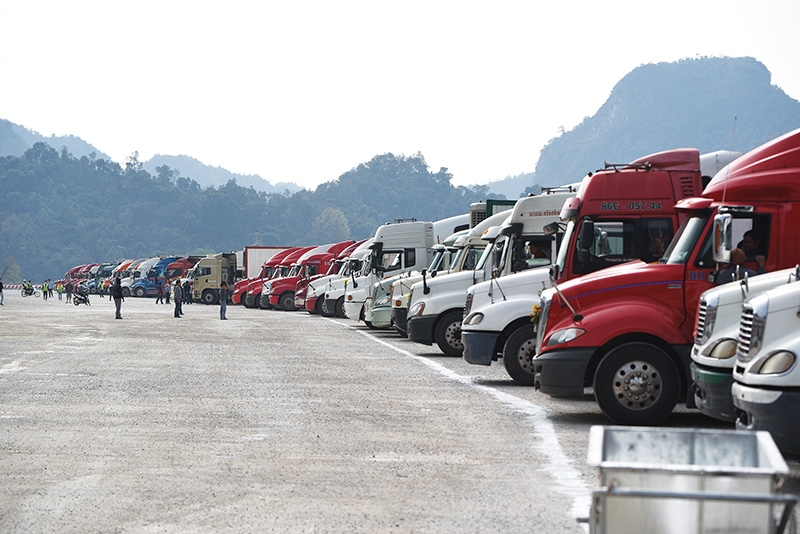Agriculture receiving substantial support
 |
| Some trucks that had been stuck at the Chinese border are beginning to be allowed across with goods |
On February 5 and 6, over 100 out of 362 fruit trucks were allowed through the Friendship Border Gate and Dong Dang Station, having been stuck at the Chinese border since January 31. Major exported goods were agricultural products, including chilli and fresh fruit.
This was the result of China closing wholesale and border markets such as Pingxiang Shi due to the coronavirus, or nCoV, epidemic.
Nguyen Cong Truong, vice chairman of Lang Son People’s Committee, spoke at an urgent conference hosted by the Ministry of Agriculture and Rural Development (MARD) last week.
“Although the goods can enter into China, they are still stuck because the wholesale markets will be shut until February 8,” said Truong. “If the situation doesn’t improve, they will keep the markets closed. Therefore, farmers should remain calm and store their goods on the farm until the markets have re-opened.”
Truong disclosed the unfortunate news that some of the stricken traders have been forced to sell their goods at drastically reduced prices. “Hundreds of trucks are stuck at the border gates, so buyers are paying just VND3,000-4,000 (13–17 US cents) per kilogramme of dragon fruit and VND1,000 (3 US cents) per kg of watermelon,” he said.
Meanwhile, Pham Van Canh, Vice Chairman of the Mekong Delta province of Long An, where 2,000 tonnes of dragon fruit are still in stock, said that by the end of February the province will harvest 30,000 additional tonnes of the fruit.
According to Canh, 75 per cent of Long An’s dragon fruit is exported to China. Some 30 per cent, equal to 300 containers, was deposited at a price of VND40,000-50,000 ($1.70-2.20) per kg and was intended for export from January 27 to February 29. However, the importer has cancelled the order.
“Another buyer cancelled 200 containers of dragon fruit that they agreed to buy at the price of VND50,000 ($2.20). Now they want to pay the farmers VND5,000 (20 US cents) per kg,” Canh said.
Canh’s view is that over the years, the price of dragon fruit in the province has been set by Chinese buyers. As sales are usually conducted without contracts, this poses significant risks for local farmers. Therefore, Canh urged the MARD to negotiate and find a way to support the farmers.
Speaking at the MARD conference, Minister of Agriculture and Rural Development Nguyen Xuan Cuong said the ministry is actively co-ordinating with the trade offices of Vietnamese embassies around the world to promote trade for agricultural exports.
“In 2020, the ministry will organise export promotion missions to the United Arab Emirates, the United States, Brazil, Japan, Russia, Australia, New Zealand, South Korea, Indonesia, Myanmar, and European countries,” Cuong said.
He also said that the MARD will continue to work with the Trade Office of the Embassy of Vietnam in China to deploy trade promotion and market development delegations in key localities of China, as soon as China brings the nCoV outbreak under control.
Regarding immediate solutions in the context of a prolonged epidemic, the MARD proposed that localities promote goods and agricultural products for consumption in retail systems, prioritising the domestic market.
Meanwhile, on February 5, Deputy Minister of Industry and Trade Tran Quoc Khanh issued a written request to Vietnam Logistics Business Association (VLBA) to recommend that its members support farmers by reducing warehousing costs and transportation.
Responding to Khanh’s proposal, VLBA chairman Le Duy Hiep said that he will mobilise members to reduce storage costs (particularly cold storage) by 10-20 per cent.
The State Bank of Vietnam and other commercial banks met with businesses affected by the epidemic to discuss credit solutions to support them, such as interest rate reduction, debt restructuring, and even debt freezing, in the hope of maintaining normal activities and transactions.
Meanwhile, acknowledging the difficulties resulting from goods piling up at the border, Lang Son province’s leaders agreed to only charge usual parking fees, foregoing any additional charges for the waiting time. Drivers and owners have also been provided with free accommodation.
Along with authorities and logistics businesses, supermarkets like Big C and Hapro have moved to support farmers.
Nguyen Thi Phuong, deputy general director of Central Group Vietnam, told VIR that with 37 supermarkets which serve 70 million consumers, Big C can help to consume 2 per cent of the total export of fruits. “The local authorities have contacted us regarding the fruit currently stuck at the border. We will support the farmers by purchasing watermelon and dragon fruit at a price of VND6,000 (26 US cents) and VND14,000 (60 US cents) per kg, and will continue to do so until the products have stabilised,” she said.
Meanwhile, Vu Thanh Son, general director of Hapro Mart, said that as a company providing agricultural products domestically and abroad, Hapro immediately contacted trade centres in the south to promote export activities to Hapro’s traditional markets.
“Other exporters should follow suit, so we can change the market from China. We also buy their products to provide to the domestic market through our market systems,” he said.
Exported vehicles entering China will be controlled by a specialised driver crew under strict medical supervision. These people will be given a medical examination and isolation at the border when returning to Vietnam.
When the freight vehicles from China pass, drivers and cargo owners will be given a medical examination before customs clearance, then the freight trucks will be directed to a separate gathering area. Drivers and cargo owners are only allowed to stay in the quarantined area until the import and export of goods is completed. Vehicles imported before leaving the gate to go inland will be disinfected, with a comprehensive epidemic prevention room under strict control to prevent coronavirus.
The Ministry of Agriculture and Rural Development encourages owners not to transport goods to the border because if the Chinese side does not accept, the goods will be left in stock and they will have to cover all the related expenses.
Nguyen Xuan Cuong - Minister of Agriculture and Rural Development
Acute respiratory syndrome associated with the novel coronavirus is dangerous for the health of both humans and the global economy. The epidemic impcts Vietnam’s agricultural sector in three aspects. Firstly, it directly impacts agricultural trade because China is a huge agricultural export market for Vietnam, accounting for 24 per cent of Vietnam’s total exports. However, the epidemic has reduced 14 per cent of Vietnam’s export value to the country, particularly since January. By the end of January and into early February, right after the Lunar New Year, trade between the two countries was congested. Secondly, it impacts investment. The outbreak of the epidemic has limited travel and thus connections for entrepreneurs between the two countries. Thirdly, it impacts contract signings. Chinese partners have come to the final steps of considering the granting of official licenses to some goods, but due to the epidemic, delegations from both sides cannot carry out working visits. Therefore, the effects caused by coronavirus to agriculture in Vietnam are huge and could last for a long time. So far, the Ministry of Agriculture and Rural Development has held a conference to implement solutions for provinces exporting agricultural products, associations, enterprises, entrepreneurs, and farmers. Accordingly, we will review the volume of agricultural products and groups of goods exported to China until the end of the year to give out different scenarios. In addition, we will promote domestic products, serving the large consumer market. Besides this, we will also focus on deep processing. Processing enterprises must closely connect with material areas to reduce the volume of exported fresh products. Although goods have been re-exported to China through border gates, the ministry still asks the logistics sector to check their cold storage to support farmers and maintain the quality of agricultural products for longer time. Particularly, we have thought of restructuring the industry based on linking chains. It is time to reduce exporting raw material and unprocessed products, along with seeking new markets. Besides the current epidemic, we are also getting ready to fight against bird flu, or H5N1, which has appeared in Hunan province in China. H5N1 has some types which can infect humans, with a high rate of casualties. This year will see two months of wet weather from April, which is very convenient for viruses and epidemics to develop. Hunan is quite close to Vietnam and our poultry is quite popular, the most popular it has ever been, in fact. If we do not prevent the virus, it will heavily impact domestic agriculture. Therefore, we sent chairpersons of provinces and cities an urgent electric document, No.735/CD-BNN-TY, on implementing synchronised solutions to prevent bird flu. |
| According to the data of General Department of Customs, the total value of imports and exports between Vietnam and China in January was only $8.29 billion, down 25.8 per cent compared to December and 11.8 per cent compared to the same period last year. In the three working days after the Lunar New Year holiday (January 30 and 31 and February 1), the total average export value of Vietnam to China reached $82.1 million per day, while import value was only $182.8 million per day, equal to 63 and 70 per cent, respectively, of normal working days throughout January. |
What the stars mean:
★ Poor ★ ★ Promising ★★★ Good ★★★★ Very good ★★★★★ Exceptional
Themes: COVID-19
- 67 million children missed out on vaccines because of Covid: UNICEF
- Vietnam records 305 COVID-19 cases on October 30
- 671 new COVID-19 cases recorded on October 1
- Vietnam logs additional 2,287 COVID-19 cases on Sept. 21
- People’s support decisive to vaccination coverage expansion: official
Related Contents
Latest News
More News
- NAB Innovation Centre underscores Vietnam’s appeal for tech investment (January 30, 2026 | 11:16)
- Vietnam moves towards market-based fuel management with E10 rollout (January 30, 2026 | 11:10)
- Vietnam startup funding enters a period of capital reset (January 30, 2026 | 11:06)
- Vietnam strengthens public debt management with World Bank and IMF (January 30, 2026 | 11:00)
- PM inspects APEC 2027 project progress in An Giang province (January 29, 2026 | 09:00)
- Vietnam among the world’s top 15 trading nations (January 28, 2026 | 17:12)
- Vietnam accelerates preparations for arbitration centre linked to new financial hub (January 28, 2026 | 17:09)
- Vietnam's IPO market on recovery trajectory (January 28, 2026 | 17:04)
- Digital economy takes centre stage in Vietnam’s new growth model (January 28, 2026 | 11:43)
- EU Council president to visit Vietnam amid partnership upgrade (January 28, 2026 | 11:00)


 Tag:
Tag:




















 Mobile Version
Mobile Version